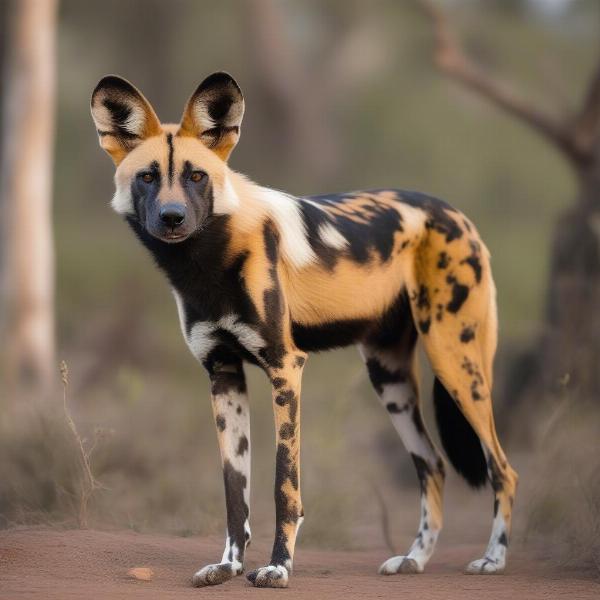The search term “wild dogs for sale” raises complex questions about legality, ethics, and animal welfare. While the desire to own an exotic animal can be strong, it’s crucial to understand the significant responsibilities and potential dangers involved in acquiring a wild animal, especially a canine species. This article will explore the challenges and ethical considerations surrounding the concept of wild dogs for sale, offering valuable information for those considering such a purchase.
Understanding the Term “Wild Dog”
What exactly constitutes a “wild dog”? The term can encompass a variety of canid species, from dingoes and African wild dogs to hybrid wolfdogs. Each species has unique characteristics, needs, and legal restrictions regarding ownership. It’s essential to research the specific species you are interested in and understand the local and national laws governing their ownership. Often, permits and specialized enclosures are required, and in many cases, private ownership is strictly prohibited.
 Examples of Wild Dog Species
Examples of Wild Dog Species
The Ethical Dilemma of Wild Dog Ownership
Keeping wild animals as pets raises serious ethical concerns. Wild canines are adapted to specific environments and social structures that are difficult, if not impossible, to replicate in a domestic setting. Their natural behaviors, including hunting, pack dynamics, and extensive roaming, often conflict with the constraints of pet ownership. This can lead to stress, behavioral problems, and even aggression in the animal. Furthermore, the removal of wild animals from their natural habitats can negatively impact fragile ecosystems and contribute to the decline of wild populations.
Legality and Regulations
The legality of owning a wild dog varies significantly depending on location. Some countries and regions have outright bans on private ownership of certain species, while others may require permits or licenses. It’s paramount to research the specific regulations in your area before considering acquiring a wild canine. Penalties for illegal ownership can be severe, including hefty fines and confiscation of the animal.
Alternatives to Wild Dog Ownership
If you are fascinated by wild canines, consider supporting conservation efforts that protect these animals in their natural habitats. Donating to reputable wildlife organizations or volunteering with rescue centers can be a rewarding way to contribute to the well-being of these magnificent creatures. Alternatively, consider adopting a domestic dog breed that shares some physical or behavioral characteristics with your favorite wild canine.
Considering the Long-Term Commitment
Caring for any animal is a significant responsibility, but owning a wild dog requires an even greater commitment. Their unique dietary needs, veterinary care requirements, and potential for destructive behavior necessitate extensive research and preparation. Are you prepared to provide the necessary resources, including specialized enclosures, enrichment activities, and experienced veterinary care?
Conclusion
The allure of owning a wild dog can be tempting, but it’s crucial to prioritize the animal’s welfare and adhere to legal and ethical guidelines. Thorough research, careful consideration of the long-term commitment, and a deep understanding of the complexities involved are essential before embarking on such a venture. Remember, responsible animal ownership involves making informed decisions that benefit both the animal and the wider ecosystem.
FAQ
- Can I legally own an African wild dog? In most cases, private ownership of African wild dogs is prohibited due to their endangered status and complex needs.
- What are the challenges of owning a wolfdog hybrid? Wolfdogs can exhibit unpredictable behavior and require specialized training and socialization. Their legal status also varies depending on the percentage of wolf ancestry.
- Are there any domesticated dog breeds that resemble wild dogs? Yes, several breeds share physical or behavioral characteristics with wild canines, such as Shiba Inus, Alaskan Malamutes, and Czechoslovakian Wolfdogs.
- How can I support wild dog conservation? Consider donating to reputable wildlife organizations or volunteering with rescue centers dedicated to protecting wild canines.
- What should I do if I encounter a wild dog for sale? Research the seller thoroughly and verify the legality of the sale. If you suspect illegal activity, contact your local wildlife authorities.
- What are the ethical implications of owning a wild dog? Wild canines have complex social and environmental needs that are difficult to replicate in captivity. Their removal from the wild can also negatively impact fragile ecosystems.
- Where can I find more information about wild dog conservation? Reputable wildlife organizations, such as the African Wildlife Foundation and the World Wildlife Fund, offer extensive information about wild canines and conservation efforts.
ILM Dog is a leading online resource for dog owners and enthusiasts worldwide, dedicated to providing reliable and practical advice on all aspects of dog care, from breed selection and health to training and nutrition. We offer expert guidance and valuable resources to help you provide the best possible care for your canine companion. For further assistance, please contact us via email at [email protected] or by phone at +44 20-3965-8624. ILM Dog is your trusted partner in responsible dog ownership.